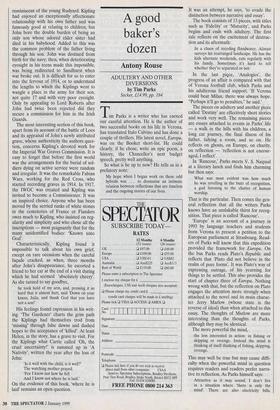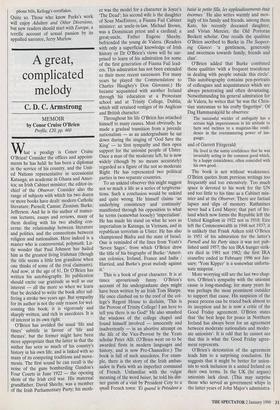A good baker's dozen
Antony Rouse
ADULTERY AND OTHER DIVERSIONS by Tim Parks Secker, £14.99, pp. 184 Tim Parks is a writer who has earned our careful attention. He is the author of two successful books on his life in Verona, has translated Italo Calvino and has done a couple of thrillers. His latest novel, Europa, was on the Booker short-list. He could clearly, if he chose, write an epic poem, a history, the Chancellor's next budget speech, pretty well anything.
So what is he up to now? He tells us in a prefatory note: My hope when I began work on these odd hybrids was . . . to dramatise an intimate relation between reflections that are timeless and the ongoing stories of our lives. It was an attempt, he says, 'to evade the distinction between narrative and essay'.
The book consists of 13 pieces, with titles such as 'Fidelity' or 'Maturity', and Parks begins and ends with adultery. The first tale reflects on the excitement of destruc- tion and its aftermath:
In a chaos of receding floodwater, Alistair surveys his rearranged landscape. He has the kids alternate weekends, eats regularly with his family. Sometimes it's hard to tell whether they're separated or not.
In the last piece, 'Analogies', the progress of an affair is compared with that of Verona football club, which Parks and his adulterous friend support. 'If Verona could beat Milan, there was always hope. "Perhaps it'll go to penalties," he said.'
The pieces on adultery and another piece called 'Destiny' are effectively short stories and work very well. The remaining pieces are essays attached to events in Parks' life — a walk in the hills with his children, a long car journey, the final illness of his father, tidying a room, and so on. He reflects on ghosts, on Europe, on charity, on reflection — 'reflection is not encour- aged, I reflect'.
In 'Rancour,' Parks meets V. S. Naipaul at a literary lunch and finds him charming but then says:
What was most evident was how much he was revelling in the buzz of recognition, a god listening to the chatter of human worship.
That is the particular. Then comes the gen- eral reflection that all the writers Parks knows have an unslakable thirst for recog- nition. That piece is called 'Rancour'.
`Europe' is an account of a journey in 1993 by language teachers and students from Verona to present a petition to the European parliament at Strasbourg. Read- ers of Parks will know that this expedition provided the framework for Europa. On the bus Parks reads Plato's Republic and reflects that 'Plato did not believe in the realm of pure forms'. It was Plato's way of expressing outrage, of his yearning for things to be settled. This also provides the start of chapter three of Europa. Nothing wrong with that, but the reflection on Plato engages the attention more strongly when attached to the novel and its main charac- ter Jerry Marlow (whose state is the reverse of ideal) than when attached to this essay. The thoughts of Marlow are more interesting than the thoughts of Parks, although they may be identical.
The more powerful the mind,
the less interested in action: in fishing or skipping or revenge. Instead the mind is thinking of itself thinking of fishing, skipping, revenge.
This may well be true but may cause diffi- culty when the powerful mind in question requires readers and readers prefer narra- tive to reflection. As Parks himself says: Attractive as it may sound, I don't live
in a situation where 'there is only the mind'. There are also electricity bills, phone bills, Kellogg's cornflakes.
Quite so. Those who know Parks's work will enjoy Adultery and Other Diversions, but new readers should start with Europa, a terrific account of sexual passion by its appalled narrator, Jerry Marlow.



























































 Previous page
Previous page